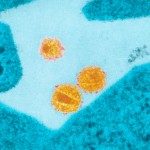Lien vers Pubmed [PMID] – 3649576
Nature 1987 Aug 6-12;328(6130):543-7
Because of the growing incidence of AIDS (acquired immune deficiency syndrome), the need for studies on animal models is urgent. Infection of chimpanzees with the retroviral agent of human AIDS, the human immunodeficiency virus (HIV), will have only limited usefulness because chimpanzees are in short supply and do not develop the disease. Among non-human primates, both type D retroviruses and lentiviruses can be responsible for immune deficiencies. The D-type retroviruses, although important pathogens in macaque monkey colonies, are not satisfactory as a model because they differ in genetic structure and pathophysiological properties from the human AIDS viruses. The simian lentivirus, previously referred to as simian T-cell lymphotropic virus type III (STLV-III), now termed simian immunodeficiency virus (SIV) is related to HIV by the antigenicity of its proteins and in its main biological properties, such as cytopathic effect and tropism for CD4-bearing cells. Most importantly, SIV induces a disease with remarkable similarity to human AIDS in the common rhesus macaques, which therefore constitute the best animal model currently available. Natural or experimental infection of other monkeys such as African green monkeys or sooty mangabeys has not yet been associated with disease. Molecular approaches of the SIV system will be needed for biological studies and development of vaccines that could be tested in animals. We have cloned and sequenced the complete genome of SIV isolated from a naturally infected macaque that died of AIDS. This SIVMAC appears genetically close to the agent of AIDS in West Africa, HIV-2, but the divergence of the sequences of SIV and HIV-2 is greater than that previously observed between HIV-1 isolates.

